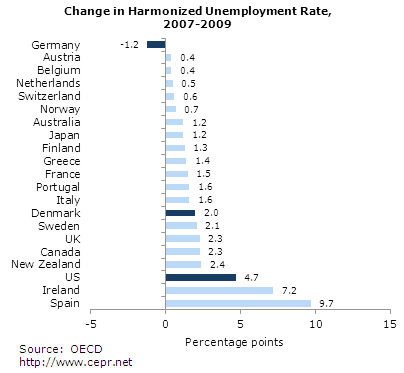November 14, 2012
Unemployment remains stubbornly high, and even since the end of the Great Recession, millions of Americans continue to suffer from long-term unemployment. In the hopes of fostering a greater understanding of the problem of long-term unemployment, its consequences, and policies that can address the problem, The Upjohn Institute has just released a new edited volume by Lauren Appelbaum, “Reconnecting to Work: Policies to Mitigate Long-Term unemployment and Its Consequences.” Included amongst the examination of different policies is a chapter from CEPR’s John Schmitt, “Labor Market Policy in the Great Recession: Some lessons from Denmark and Germany.”
Schmitt looked at the labor-market experience of 21 rich countries with a focus on Denmark and Germany. The graph below represents the change in unemployment rates in these countries between the years 2007 – the beginning of the recession — and 2009.

Prior to the recession, Denmark had been one of the world’s most successful economies, but has struggled in recent years. Germany, on the other hand, has outperformed many of the rich countries since 2007 despite earlier labor market struggles. As Schmitt explains, labor market institutions seemed to be at the root of the recent developments in each economy. Denmark’s institutions and their extensive opportunities for education, training, and placement of unemployed workers, was positioned to perform well at or near full employment, but significantly less so in a downturn. And with a focus on job security by keeping workers connected to employers, Germany was able to spread the pain of the downturn and has outperformed many of the world’s other rich countries since 2007, though it was on less stable ground after reunification in the 1990s through the 2000s. It was through this program of “work sharing,” or companies cutting hours rather than workers while partially compensating the workers for lost hours, that Germany actually saw its unemployment level fall during the recession.
Schmitt and CEPR have argued that work sharing could be used to lower the unemployment rate here in the United States, as well — an idea that appears to have caught on. It was even alluded to in President Obama’s acceptance speech, having already been incorporated into the Middle Class Tax releif and Job Creation Act of 2012.






